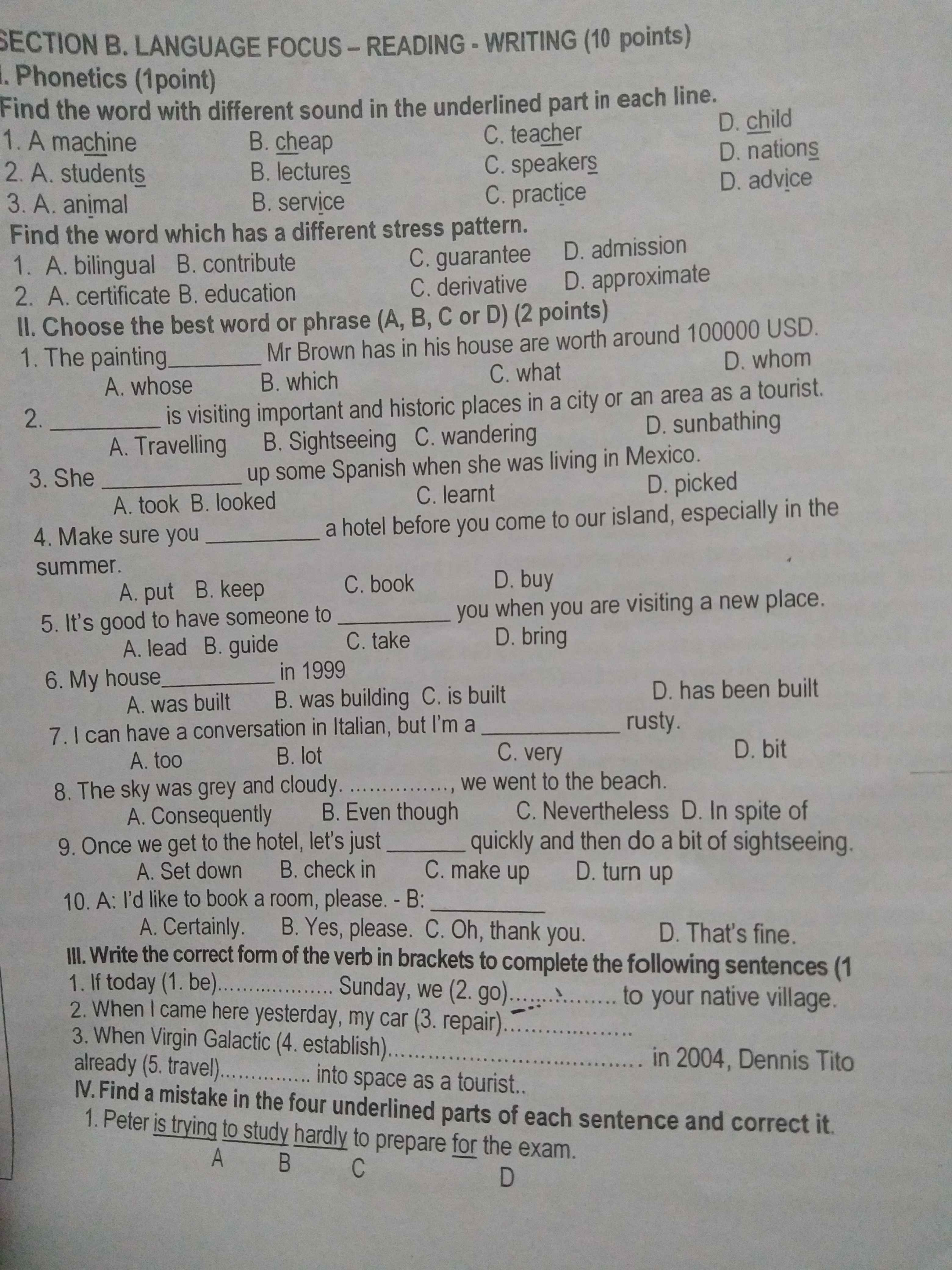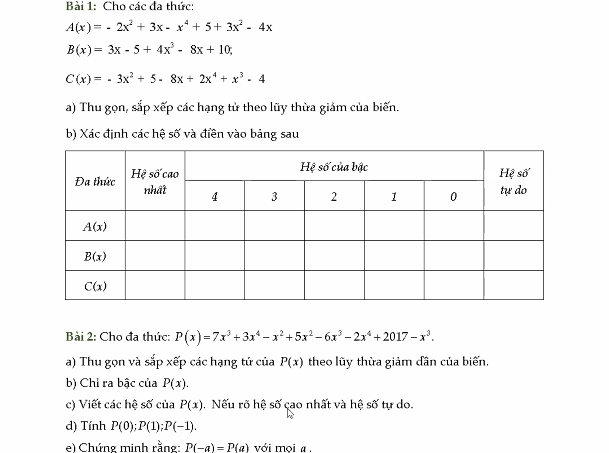Giúp mik vs 5h30 mik phải nộp r
Hãy nhập câu hỏi của bạn vào đây, nếu là tài khoản VIP, bạn sẽ được ưu tiên trả lời.



a) Ta có: \(P\left(x\right)=7x^3+3x^4-x^2+5x^2-6x^3-2x^4+2017-x^3\)
\(=x^4+4x^2+2017\)
b) Bậc của P(x) là 4
c) Các hệ số của P(x) là 1;4;2017
Hệ số cao nhất là 4
Hệ số tự do là 2017
d) \(P\left(0\right)=0^4+4\cdot0^2+2017=2017\)
\(P\left(1\right)=1^4+4\cdot1^2+2017=1+4+2017=2022\)
\(P\left(-1\right)=\left(-1\right)^4+4\cdot\left(-1\right)^2+2017=1+4+2017=2022\)
e) \(P\left(-a\right)=\left(-a\right)^4+4\cdot\left(-a\right)^2+2017=a^4+4a^2+2017\)
\(P\left(a\right)=a^4+4a^2+2017\)
Do đó: P(-a)=P(a)



12 What do you often do after school?
13 What is he doing now?
14 Where are you often have dinner?
15 What is Lan going to buy
16 Where are they going to stay?
17 Why do you like learning English?
18 How many pens does she want>
19 What does Nam have for for lunch
20 How many books does Ha have in the bags?
12. What do you often do after school?
13. What is he doing now?
14. Where do you often have dinner?
15. What is Lan going to buy?
16. Where are they going to stay?
17. Why do you like learning English?
18. How many pens does she want?
19. What does Nam have for lunch?
20. How many books does Ha have in the bags?

Em xem dùng kiến thức mình đã học tự làm, tự làm được câu nào đăng lên anh check đáp án cho, câu nào không biết hẳn thì suy luận, sai anh sửa!


9. Has the work been done by him?
10. The boxes were opened and cigarettes were taken out by us
11. She was given a new one
12. He is proved wrong
13. We were promised higher wages
14. This is the third time we have been written to about this by them
15. We were asked to be there at 8 o'clock
16. She is being shown how to do it










a) Ta có: \(x^2-3=0\)
nên \(x^2=3\)
hay \(x\in\left\{\sqrt{3};-\sqrt{3}\right\}\)
b) Ta có: \(4x^2-9=0\)
\(\Leftrightarrow\left(2x-3\right)\left(2x+3\right)=0\)
\(\Leftrightarrow\left[{}\begin{matrix}x=\dfrac{3}{2}\\x=-\dfrac{3}{2}\end{matrix}\right.\)
c) Ta có: \(\left(x+2\right)^2-\left(x-2\right)^2=5\)
\(\Leftrightarrow x^2+4x+4-x^2+4x-4=5\)
\(\Leftrightarrow8x=5\)
hay \(x=\dfrac{5}{8}\)
d) Ta có: \(\left(x+2\right)^3-x^3+6x^2=7\)
\(\Leftrightarrow x^3+6x^2+12x+8-x^3+6x^2-7=0\)
\(\Leftrightarrow12x^2+12x+1=0\)
\(\Delta=12^2-4\cdot12\cdot1=144-48=96\)
Vì Δ>0 nên phương trình có hai nghiệm phân biệt là:
\(\left\{{}\begin{matrix}x_1=\dfrac{-12-4\sqrt{6}}{24}=\dfrac{-3-\sqrt{6}}{6}\\x_2=\dfrac{-12+4\sqrt{6}}{24}=\dfrac{-3+\sqrt{6}}{6}\end{matrix}\right.\)
e) Ta có: \(\left(x-2\right)^2-\left(x-1\right)\left(x+1\right)=7\)
\(\Leftrightarrow x^2-4x+4-x^2+1=7\)
\(\Leftrightarrow-4x=2\)
hay \(x=-\dfrac{1}{2}\)